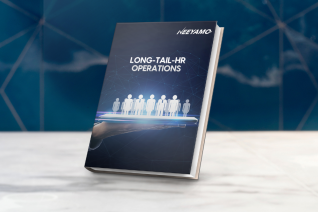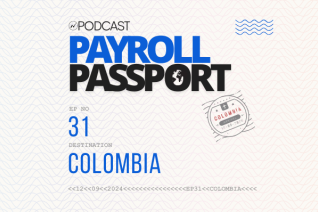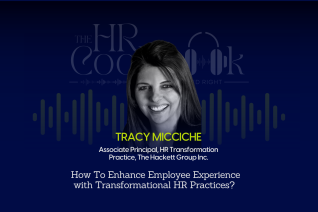Establish your presence globally with Neeyamo as we help you go beyond borders to manage your global payroll services and hire new talent in Colombia.
Overview
Colombia is part of a select category of 17 megadiverse nations, hosting an impressive array of over 5,000 biological species within its borders. Renowned for its exceptional biodiversity, Colombia proudly claims the title of the highest number of species per unit area globally. Moreover, the nation is a hub for avian diversity, boasting a remarkable collection of over 1800 bird species. Beyond its rich biodiversity, Colombia also holds the 43rd position on the world's largest economies list.
If your organization's expansion plans require hiring employees in Colombia and you lack a physical entity in the country – a key requisite to hiring local talent, your solution is right here: the best payroll software for large companies, Neeyamo – Payroll business solutions. Neeyamo's international payroll services assist with onboarding and managing employees in Colombia, along with processing a firm's payroll and tax services, compliance, benefits, and more.
Tools And Instances
Facts And Stats
Capital
Bogota
Currency
Colombian Peso (COP)
Official Language
Spanish
Fiscal Year
1 January – 31 December
Date Format
DD/MM/YYYY
Country Calling Code
+57
Other Languages
65 Amerindian languages, 2 Creole languages, Romani language
Time Zone
UTC-05:00
Global Payroll
Overview
Handling payroll for a widespread workforce can pose a significant challenge for any organization, and the added complication of compliance can make things worse. If companies spend more time processing payroll, it directly impacts day-to-day operations and their overall productivity.
Over the years, Neeyamo has observed these complexities and strived to provide Global HR solutions - payroll solutions through a single technology platform - Neeyamo Payroll. Neeyamo's automatic payroll services provide multi-level controls to ensure adherence to local regulatory requirements.
How is payroll done?
Neeyamo acts as an employer's payroll tax calculator, ensuring adherence to local regulatory requirements using multi-level controls. Benefits of the payroll system include providing timely and accurate payroll - courtesy of our experts worldwide and using a tech-based integrated smart helpdesk solution with seamless support experience manned by payroll experts - Neeyamo has all your payroll needs covered.
Payroll Taxes
Payroll tax is the percentage amount retained from an employee's salary and paid to the government to invest in the general population's welfare. These are statutory in nature and are levied from both the employer and employee. Additional statutory contributions are made by employers towards providing both short-term and long-term benefits for their employees.
Employee Taxes
The following are the employee payroll contributions:
- 4.00% - Pension Fund (The maximum contribution per month is equal to 25 minimum monthly salaries (SMMLV)).
- 4.00% - Medical Plan
- 8.00% - Total Employee Cost
The income tax bracket for employees is as follows:
- 0.0% 0-1,090 Tax Units
- 19.0% 1,090-1,700 Tax Unit
- 28.0% 1,700- 4,100 Tax Units
- 33.0% 4,100- 8,670 Tax Units
- 35.0% 8,670- 18,970 Tax Units
- 37.0% 18,970- 31,000 Tax Units
- 39.0% 31,000 Tax Units +
Where 1 Tax Unit= 36,308 COP.
Employer Taxes
The following are the Employer Payroll Contributions
- 12.00% - Pension Fund
- 8.00% - Medical Plan
- 0.52% – 6.96% - Labor Risks
- *4.00% - Family Compensation Funds
- *3.00% - Family Welfare (ICBF)
- *2.00% - National Apprenticeship Service (SENA)
- 20.52% - 26.96% - Total Employment Cost
Payroll Cycle
Overview
Undoubtedly, payroll is a critical process for any organization. The pay cycle in Colombia refers to the period for which an organization pays its employees, and this can vary depending on the pay frequency that the organization chooses to adopt.
Frequency
The payroll cycle is bi-weekly or monthly. For employees who are paid bi-weekly, wages are paid on the 15th and last working day of the month. For employees who are paid monthly, wages are paid on the last working day of the month.
13th Month Cycle
Paying a 13th-month salary is mandatory in Colombia. The employer must pay the first half within the first 15 days of June and the other half within the first 20 days of December.
Global Work
Overview
Employer of Record Meaning:
An Employer of Record (EOR) service provider helps you eliminate the hassle of handling complexities while onboarding a new employee in an international location. They help bridge the gap that otherwise mandates organizations to have a local registered entity and a local bank account prior to making a job offer to an international hire.
An EOR service provider acts as a legal employer, facilitates salary payments, and manages other statutory requirements such as health insurance, payroll taxes, and employee benefits, ensuring compliance with local tax laws and regulations.
This allows organizations to focus on collaborating with the employee in Colombia for operational tasks, with the knowledge that they have a cost-effective solution to support their global payroll & HR requirements as they continue their global expansion.
HR Mandates and Practices
Minimum Wage
The new monthly minimum wage for 2026 is increased to 1,750,905 COP from 1,423,500 COP.
Working Hours
- Effective July 15, 2025, the workweek will be reduced to 44 hours.
- And from July 15, 2026, it will be reduced further to 42 hours.
- Effective July 15, 2025, ordinary work hours may be distributed variably across days of the week, provided daily and weekly limits are respected.
Overtime
Overtime Regulations Update (Effective June 25, 2025):
- Ministry of Labor authorization for overtime is no longer required.
- Employers are now mandated to register all overtime hours and furnish these records to employees.
- Failure to comply may lead to fines and the suspension of overtime assignment privileges.
Sunday and Holiday Surcharge Updates:
- From July 1, 2025: An 80% surcharge will apply.
- From July 1, 2026: This increases to a 90% surcharge.
- From July 1, 2027: A 100% surcharge will be implemented.
Weekly Rest Day Rules
From June 25, 2025, the previous restrictions on the mandatory weekly rest day are being lifted. Employers and employees now have the flexibility to mutually agree on any day of the week to serve as the designated rest day. This should help with more diverse scheduling needs.
Day and Night Hours
- Daytime: 6:00 a.m. to 7:00 p.m.
- Nighttime: 7:00 p.m. to 6:00 a.m.
Hiring and Onboarding Requirements
Hiring
In order to work in Colombia, a special permit is required, which was recently altered by the 6045 Resolution of 2017. To recognize the permit that is to be issued to the employee, it is imperative to recognize whether the employment is short-term or long-term.
Hiring of employees
Preference and discrimination
There are no legal requirements to give preference in hiring or not to discriminate against particular people or groups of people. However, there are tax benefits or incentives for hiring people from vulnerable groups; that is, people in a situation of displacement, in the process of reintegration or having a disability, employees under 28 years of age and women over 40 years of age with more than one year of unemployment (article 31 of Law No. 361 of 1997, and Law No. 1429 of 2010).
Onboarding
The following are required during onboarding:
- Copy of worker visa (for expats)
- Copy of the Worker's ID card
- Records of social security contribution (if applicable)
Probation
The trial period must be agreed upon in writing. Its length varies depending on the type of contract agreed by the parties, but cannot exceed in any case two (2) months. For fixed-term contracts or definite period ones (i.e. employment contracts for completing a specific task or the occurrence of a specific event) the trial period cannot exceed one-fifth part (1/5) of the term initially agreed. When considering the existence of successive employment contracts, the parties cannot agree to trial periods, but for the first contract.
Leave
Public Holidays
The following public holidays are recognized in Colombia:
- 1 Jan: New Year's Day
- 9 Jan: Epiphany
- 20 Mar: Saint Joseph's Day
- 6 Apr: Maundy Thursday
- 7 Apr: Good Friday
- 1 May: Labor Day / May Day
- 22 May: Ascension Day
- 12 Jun: Corpus Christi
- 19 Jun: Sacred Heart
- 3 Jul: Feast of Saint Peter and Saint Paul
- 20 Jul: Independence Day
- 7 Aug: Battle of Boyacá Day
- 21 Aug: Assumption of Mary
- 16 Oct: Columbus Day
- 6 Nov: All Saints' Day
- 13 Nov: Independence of Cartagena
- 8 Dec: Feast of the Immaculate Conception
- 25 Dec: Christmas Day
Annual Leave
Employees are entitled to 15 consecutive days of annual leave with full pay after one year of service. Employees are required to take at least six annual leave days a year.
In cases where the employer wants the employee to take leave on a specific day, it must inform the employee of the leave dates at least 15 days before the date on which that leave will begin.
An employee may voluntarily accept payment in lieu of up to half the annual vacation allotment. Up to four years of vacation leave can be accrued.
Sick Leave
- Employees with at least four weeks' contributions to the Social Security system are eligible for 180 days' sick leave at two-thirds pay. The employer pays for the first two days of the absence and the social security system for the remainder.
- If the illness or injury is work-related, the employee will receive 100% of the salary from the social security system.
Maternity Leave
Every pregnant employee has the right to 18 weeks of paid leave at delivery, remunerated with the salary earned at the beginning of the leave.
The maternity leave for mothers of premature children will consider the difference between the gestational date and the full-term birth, which will be added to the 18 weeks. For mothers with multiple births or mothers of a disabled child, the leave will be extended by two more weeks.
The maternity leave is extended to the father in the event of the death, abandonment, or illness of the mother, and the employer of the father of the child will grant the employee leave duration equivalent to the time remaining after the birth granted to the mother. Employees shall begin to enjoy the maternity leave two weeks before the probable delivery date.
The employee must present the employer with a medical certificate, which must include the pregnancy status, the indication of the probable day of delivery, and the indication of the day from which the leave must begin, bearing in mind that, at least, it must begin two weeks before delivery.
The employee who makes use of the leave at the time of delivery will take the 18 weeks of leave to which she is entitled, as follows:
- Prepartum Maternity leaves: This shall be taken one week before the probable due date of delivery. If, for any medical reason, the expectant mother requires an additional week before delivery, she may enjoy two weeks, with 16 weeks postpartum. If otherwise, for medical reasons, the employee cannot take the week before delivery, they can enjoy the 18 weeks in the immediate postpartum period.
- Postpartum Maternity leaves: This leave shall be for 17 weeks from the date of delivery or 16 or 18 weeks due to a medical decision stated above. Out of the 18 weeks of paid leave, the week before the probable delivery will be mandatory unless the treating physician prescribes something different. The paid leave is incompatible with the domestic calamity leave, and if the latter has been requested for the birth of a child, the maternity leave days will be deducted from it.
- In the case of the working woman who, for some reason, does not enjoy the mandatory prepartum week and/or some of the 17 weeks of leave, such employee shall be entitled to pay for the weeks that she did not enjoy the leave. In the case of multiple births, the employee shall have the right to pay for an additional two weeks and, if the child is premature, to pay the difference in time between the date of delivery and the full-term birth.
- Paid rest in case of abortion: An employee who during the pregnancy suffers an abortion or a non-viable premature birth has the right to a paid leave of 2 or 4 weeks that was earned at the time of starting the leave.
- Breastfeeding Breaks: The employer must grant the employee two paid breaks, of 30 minutes each, within the day to breastfeed her child during the first six months.
Paternity Leave
A working father is entitled to 10 days of leave with full pay after the birth of his child to his spouse or permanent partner or the adoption of a child by him and his wife or permanent partner. The father must have at least 100 weeks of contributions to the social security system to qualify for full cash benefits.
Mandatory Paid Leave
- Scheduled medical appointments.
- School-related obligations where the employee's presence is required as a legal guardian.
- Participation in judicial or administrative proceedings.
Optional Leave
Effective June 25, 2025, employees who regularly commute to work by bicycle will be eligible for one optional paid leave day every six months.
Bereavement Leave
An employee is entitled to 5 working days paid leave for the death of a spouse or permanent partner, a parent, a child, a sibling, a grandparent, a grandchild, a mother or father-in-law, a son or daughter-in-law, a stepchild or a stepparent.
Other Leaves
Employees shall be granted leave for voting during elections, for the performance of temporary official positions of forced acceptance, in the event of a duly proven serious domestic calamity, to carry out union commissions inherent to the organization or to attend the funeral of their colleagues, provided that they notify the employer or their representative in due time.
Termination
Termination
In Colombia, Grounds for the termination in Colombian legislation can be divided into three categories:
- Legal grounds.
- Termination with a fair cause.
- Termination without a fair cause.
The termination without a cause includes all situations that are not considered a legal cause or a fair cause.
Notice Period
According to Colombia Labor law, if the employee is paid weekly or at shorter intervals, eight days’ notice is required. If the employee is paid less often than weekly or has been with the employer for longer than one year, a minimum of 30 days' notice is required, with three additional days added for each additional year of service at the company up to a maximum of 90 days prior notice.
Severance Pay
When the termination is without cause, employers are obligated to pay severance. For employees with an indefinite term agreement, the severance will be calculated as follows:
- Employees earning less than 10 minimum legal monthly wages are entitled to 30 days of wages for the first year of service and 20 days of salary for each additional year of service.
- Employees earning 10 minimum legal wages or more, will be entitled to 20 days of salary for the first year of service and 15 days of salary for each additional year of service.
- For employees with a fixed-term agreement, the severance would be equal to the salary of the employee until the term of the agreement expires.
Visa
Overview
There are 3 categories of Visa available in Colombia:
- “R” type visa (Resident): Meant for people who wish to permanently move to Colombia.
- “M” type visa (Migrant): Meant for people who want to temporarily live in Colombia.
- “V” type visa (Visitor): Reserved for people who are entering the country solely for visiting purposes.
If the individual has had “M” visa, they are eligible for an “R” visa. After they have had the “R” visa for five more years, they can apply to become a Colombian citizen.
Requirements for Visa
When applying for a working visa, individuals must fill out the application form online with the Ministry of Foreign Affairs website and upload the documents. After it has been reviewed and approved, applicants will have to follow the instructions of authorities for payment. The work permit application process can start once the employer and employee sign the employment contract.
Some of the other things that will be required to initiate the processing, employees need to submit:
- Copy of their passport
- Bank statements for the past 6 months
- A passport size photo
- Employers need to submit the following:
- A suitability certificate of the employee
- Proof of employment contract
- Academic proof of qualifications
- Previous year income statement
- Bank statements corresponding with six months prior the visa application
- Average monthly income proof of 100 times the legal monthly minimum wages
Any foreigners coming to work in Colombia will need to have a job offer from a local employer before applying for a visa. There are several visa types, but the most commonly used is the M visa which is valid for five years. These visas are issued in person at the Ministerio de Relaciones Exteriores’ offices in Bogota. Every foreigner with a visa valid for more than three months needs to apply and obtain a foreigner’s identity card at a regional office. This must be obtained within 15 days of entering Colombia or 15 days after the visa was issued. Once five years have been completed, foreign nationals can apply for an R visa; then, once an individual has held an R visa for five more years, they can become a Colombian citizen.
Employee Background Checks
Legal and Background Checks
As a general rule, any type of background checks that facilitates discriminatory behaviour is prohibited. There are a few sections that are inhibited in the background check process of Colombia:
- Disability or diseases
- Pregnancy test
- Unionised condition
- Blacklists
- HIV test or conditions
- Compulsory military service approval
Limitations on Background Checks:
Express prohibitions over background checks in the legislation include the following:
- HIV tests or conditions.
- Pregnancy test.
- Mandatory military service approval.
- Unionised condition.
- Diseases or disabilities.
- Blacklists.
In general, it must be said that any background check that might be considered discriminatory is prohibited, unless and objective justification is proven. Also, data protection legislation (the 1581 Act of 2012) provides certain restrictions over the information potential and former employers can publish about candidates and former employees.
Last updated on 13 January, 2026
If you have any queries or suggestions, reach out to us at irene.jones@neeyamo.com
Have Queries? Get In Touch With Us
Get in touch with one of our experts and take a quick demo of our services










